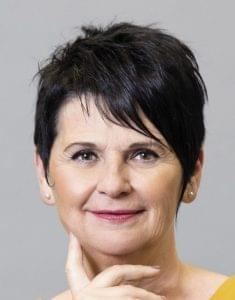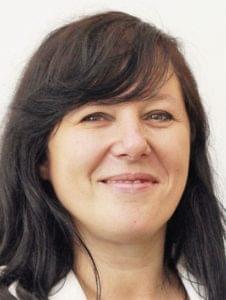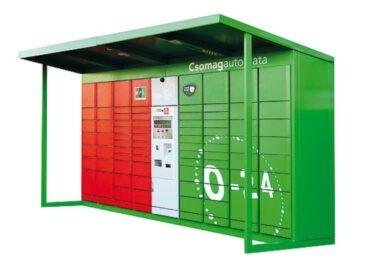A positive aftereffect of the pandemic: Goods transport is booming

Klára Ráczné Hegedűs
corporate sales director
Hungarian Post
Klára Ráczné Hegedűs, corporate sales director of Hungarian Post told our magazine that e-commerce was expanding slowly but steadily in the first half of the year, but the slowdown in consumption from May-June can now also be felt in parcel turnover, which is decreasing. “It is very difficult to tell what we can expect in the traditionally strong end-of-year parcel season. Despite this, Hungarian Post has already started preparing for the high season, negotiating with partners about the necessary resources, buying new vans and increasing the capacity of our order processing facilities.”

Ádám Bengyel
CEO and co-founder
FOXPOST
Ádám Bengyel, CEO and co-founder of FOXPOST says three key factors influence the market: rising costs, a contracting market and changing consumer needs. The sector has been struggling with workforce shortage for years. “What we see is that retail sales dropped a little in the 2nd quarter of the year, but e-commerce kept growing, although slower than in the last few years” – he explained. With its parcel lockers, FOXPOST offers high quality and cost-effective service to partners.
New regulations

Szilvia Nagy
e-commerce and
marketing manager
DHL Express
Szilvia Nagy, e-commerce and marketing manager of DHL Express: “We are partners with micro-businesses, SMEs and large companies, so we see the whole market. Hungary’s e-commerce is dominated by international (regional) firms, which means that Hungarian companies also have the chance to conquer international markets.” She added that businesses should watch out for the effects of the new consumer protection regulation, which took effect on 28 May.
Lívia Kovács, sales and marketing director of Sprinter Futárszolgálat Kft. is of the opinion that those consumers, who got used to buying online during the pandemic, won’t return in full to offline shopping. “At the same time it can be felt that consumers are shopping more cautiously, now that the prices are rising all the time.”
Shorter delivery times

László Sabjányi
general manager
Wolt Magyarország
László Sabjányi, general manager of Wolt Magyarország thinks shoppers show growing demand for user-friendly interaction in the online world too, they want to track their orders and get quick answers to their questions from the customer service. “Positive customer experience is a top priority for Wolt, on average our customer service answers shopper questions in less than a minute” – he told.

Szabolcs Fagyas
sales director
Packeta Hungary
Szabolcs Fagyas, sales director of Packeta Hungary Kft.: “The number of parcel lockers rose sharply last year: 800 new ones were installed and by the end of 2021 there were 1,250 parcel lockers in Hungary. This year we plan to increase the number of our Z-BOX parcel lockers from 40 to almost 1,000. These lockers aren’t just convenient, but eco-friendly as well.”

Dr. Károly Sáfár
CEO in Hungary
DODO
Dr Károly Sáfár, DODO’s CEO in Hungary mentioned that in the last few years delivery times became shorter, especially with the large number of food orders. DODO reacted to this need by optimising processes using its own technology. Balázs Balatonyi, sales manager of Palletways: “Our company isn’t a classic shipping or delivery firm, but a network of forwarders specialising in goods distribution.”
User needs
Sprinter Futárszolgálat is concentrating on the approaching high season, preparing for it with bigger capacity, as they calculate with more parcels than last year. The company’s experience is that eco-friendly operation is a consumer need that is becoming more and more important. Packeta Hungary Kft.’s representative talked to our magazine about the growing popularity of card payment. It first happened in 2020 that there were more card than cash payments, and last year the proportion of the latter reached 70%.
DODO offers smart logistics solutions, as the Czech start-up specialises in data-driven, artificial intelligence based delivery. Dr Károly Sáfár: “Shortening delivery routes – by applying the last mile principle – requires developing a denser network of more, but smaller warehouses (so-called “dark stores”) and small shops.”
Flexibility is a must
Palletways calculates with the fact that high motor fuel prices are here to stay, and this will influence the consumer prices of products. The economy is slowing down, and the question is whether various sectors will be able to react to the new conditions cautiously enough. DHL Express has its own fleet of airplanes, therefore they can be much more flexible in managing crisis situations. Plus they benefit from being a company with global presence by getting an insight into how other countries deal with the crisis. FOXPOST is continuously expanding its network and capacity, so today they have the biggest parcel locker network in Hungary. Their mission is to explain consumers and business partners that parcel lockers are a much better solution than home delivery.
Expansion and development
DHL Express has set the goal of becoming carbon neutral by 2050 – both in Hungary and at global level. In Budapest the company is using 3 e-cargo bicycles and 20 electric vans are serving the capital city’s region. The company is regularly installing new parcel lockers, and their Budapest site uses 100% sustainable energy. Sprinter Futárszolgálat Kft.’s representative informed that the parcel warehouse and logistics centre of the Lapker Group in Alsónémedi opened in June 2022. Here 2,150 pallets can be stored on a floor space of 7,000m², and there is a high capacity, automatic sorting line as well.
Hungarian Post has several investment projects going at the same time. They already offer same-day delivery in Budapest if parcels are mailed before 12:00. They are going to expand their parcel locker network by installing hundreds of new ones this year – and this project will continue in 2023. FOXPOST had 160 parcel lockers in 2020, but by the end of 2021 this number increased to 360; today they operate more than 700 parcel lockers with more than 60,000 compartments. By the end of 2022 the company wants to have 850 parcel lockers.
New services
Wolt Magyarország’s platform connects FMCG and other retailer partners with customers they couldn’t really reach in the past. Wolt’s new services can integrate quickly into the sales strategies of retailers, e.g. by using Wolt Drive, partners can manage orders on their own website, and Wolt is only responsible for the delivery. Packeta Hungary Kft. operates a little less than 500 parcel lockers, covering the whole of Hungary. Soon consumers will also be able to use these Z-BOXes for sending and returning parcels – and all of this from the company’s smartphone application.

The number of parcel lockers simply skyrocketed last year
Palletways offers groupage transport services for the FMCG sector too. From this year they have a new service in 10 European countries: partners who would like to distribute large volumes of goods abroad only have to take them to the central warehouse of the given country, and from there Palletways takes the goods to the end users. DODO’s parcel delivery service is fast and reliable, shipping all kinds of products ordered online, serving a wide range of partners. They also do same-day delivery, and the orders placed with restaurant chains are delivered to the doors of customers in less than 30 minutes. //
E-commerce’s expansion affects the packaging market too
Béla Cservenka, local sales manager of DS Smith Packaging Hungary: “Due to omnichannel selling, a growing number of products are required to have packaging that is suitable for both physical stores and online shops. Combining these two is a real challenge. DS Smith designs packaging that meets the highest e-commerce standards. For testing we use the DISCS (Drop, Impact, Shock, Crush, Shake) method.”

The packaging of more and more products are required to meet the standards of both physical and online sales
Hedvig Mattyasovszky, sales director of Metsä Board Hungary: “Packaging industry needs to combine brand communication with product protection and easily recyclable raw materials. The first moment when product and consumer interact is when they open the packaging; therefore designs tailored to the needs of online retail must offer a special experience for the moment of opening.” //
Related news
Price increase at Magyar Posta: this is how much the most common postal services will cost in 2025
Magyar Posta’s goal remains to provide its services efficiently and…
Read more >TikTok Shop launches in Spain
TikTok Shop has launched in Spain today, according to various…
Read more >Zalando acquires rival About You
Zalando is buying out its German competitor About You. Both…
Read more >Related news
Recognition of Consumer Protection Excellence: Honoring the Best of 2024
This year’s outstanding consumer protection officers and special award recipients…
Read more >The Joy of Giving! – SPAR stores collect non-perishable food for people in need
The Hungarian Maltese Charity Service and SPAR Hungary have launched…
Read more >KSH: industrial production decreased by 0.2 percent in October
In October, the volume of industrial production fell by 0.2…
Read more >








